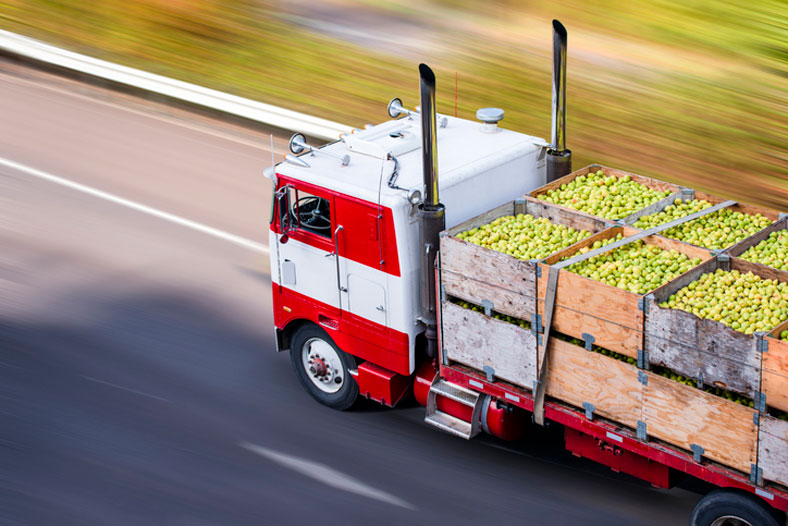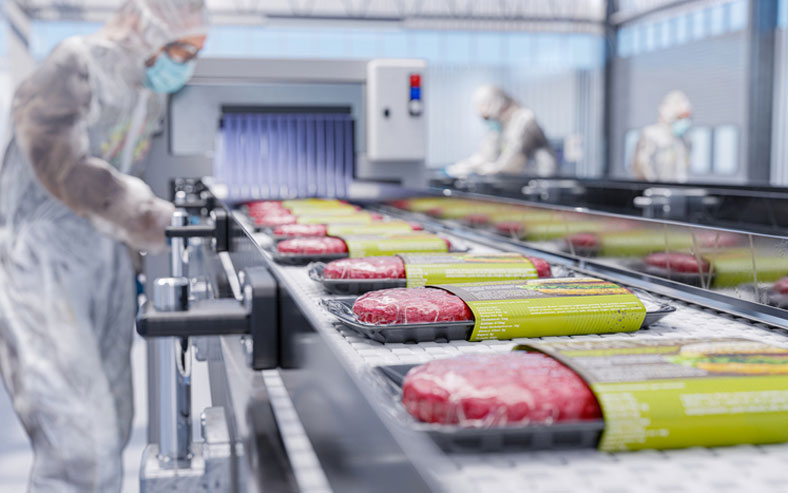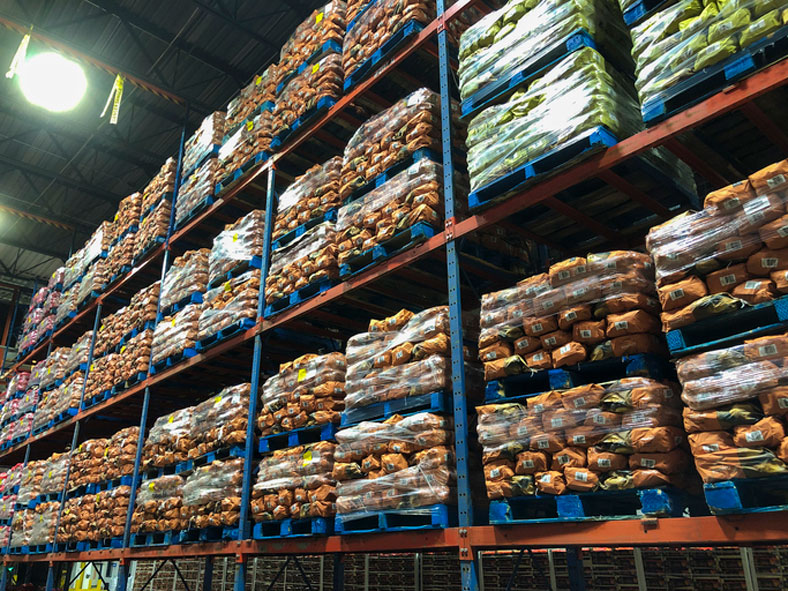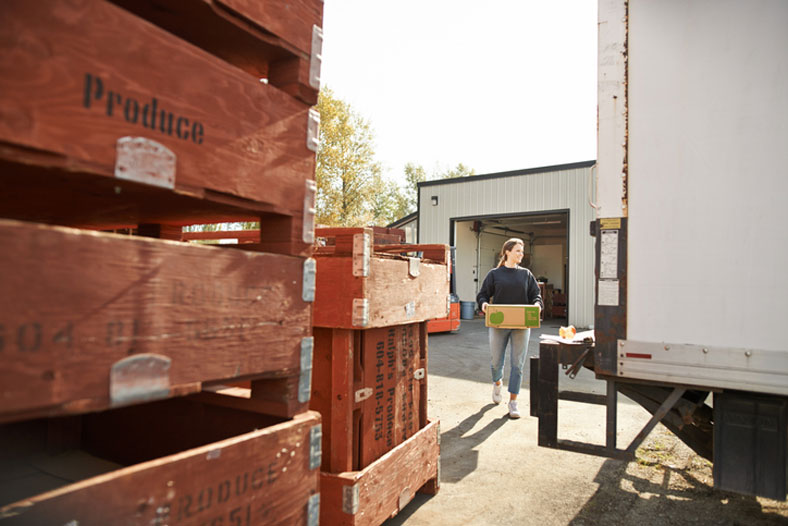Written by Scott Wilson

While all supply chains in every industry are designed to be invisible to the average customer, the food supply chain fades into the background more than most.
American grocery stores have a reputation for being some of the best stocked in the world. In terms of variety, freshness, and safety, American consumers take for granted their ability to pull in, select perfect produce and other products from around the world, and walk out of the store with it in a matter of minutes.
But that level of quality control and selection is the result of a complex process of harvesting, processing, shipment, inspection, and packaging that can sometimes reach halfway across the world before the journey is done. And each of those steps is only possible because of the hard work and attention of food supply chain management professionals.
SCM Professionals Work Behind the Scenes to Manage the Food Supply Chain

Despite being largely invisible, food supply and logistics is one of the critical services that enable modern society to exist. The concentration of food production and the ease of distribution is the only thing that makes cities possible. According to the American Trucking Association, the average American grocery store would run out of food in about three days if deliveries stopped. Even less visible, but equally critical, water purification plants would run out of products to treat drinking water in about two weeks.
You only hear about the food supply chain when it has problems… something that happens rarely thanks to skilled logistics and supply chain professionals.
But even if you count out the most dire risks, food supply chain managers have a lot to do with sustenance. We eat every day, three times a day, and many of our lives revolve around those experiences. Food supply chain management doesn’t just enable that; it makes them what they are.
Agribusiness supply chains have a huge impact on the ultimate quality of the product. Few things are as sensitive to delayed delivery, inadequate storage, or rough handling as food products. Supply chain managers are responsible for:
- Helping to develop packaging to reduce damage and wastage in all phases of the supply chain
- Ensuring adequate environmental and safety standards for food storage
- Arranging transportation that is both timely and gentle enough to get unspoiled foodstuffs to their destination intact
- Tracking inventory closely to avoid overstocking and wastage, and enabling recalls or tracing in the event of contamination
The goal for logistics professionals throughout the agricultural and food industries is for all that to happen seamlessly and without any impact on the consumer.
What is the Food Supply Chain, and What Kind of Jobs Are Available in Managing it?

Supply chain management in the food and agribusiness industry really spans two different fields.
On the input side, the supply chain brings in industrial equipment and supplies needed to run farms and harvest fields. This business looks a lot like any kind of manufacturing operation. Bulk shipments of fertilizer, feed, and tractor parts must be arranged and stored. Seasonality is big, with demands running on nature’s clock to get crops ready to harvest. Jobs on this side of the business come with titles like:
- Supply Specialist
- Senior Manager of Farm Operations and Logistics
- Director of Hog Procurement
- Agronomy Seed Logistics Manager
- Grower Production Manager
- Manager of Nursery and Fulfillment Operations
Sustainability Brings New Challenges to the Food Supply Chain
 In a way, food supply chain innovation and reliability took some important considerations off the plates of American consumers. Since their peak in the 1930s, the number of American farms has been in steady decline. Over the same period, a general movement of the population into cities took people further from the agricultural heartland. And the ability to move foods quickly and in bulk largely detached most Americans from any conception of how foods are produced.
In a way, food supply chain innovation and reliability took some important considerations off the plates of American consumers. Since their peak in the 1930s, the number of American farms has been in steady decline. Over the same period, a general movement of the population into cities took people further from the agricultural heartland. And the ability to move foods quickly and in bulk largely detached most Americans from any conception of how foods are produced.
But the awakening of environmental consciousness starting in the 1970s has shifted perceptions of the food supply. Factory farming abuses, heavy reliance on pesticides, and harmful runoff from fertilizers all made their mark. And as emissions-driving climate change starts to hit home, more and more consumers are asking where their food comes from.
They’re starting to make choices that value healthy, sustainable, local food sources. And that means supply chain managers have to create new supplier networks, new handling processes, and new transportation methods to meet demand. Tracing raw foods to the source has become more important than ever. And keeping pricing under control with less efficient, but more sustainable, production requires greater supply chain efficiency than ever.
On the output side, supply chain managers are more concerned with processing, packaging, and delivery. Timing is still a factor, but the clock starts when fresh food comes out of the ground or is processed and packaged. Strict environmental and safety controls are in focus. Managers need a strong knowledge of FDA (Food and Drug Administration) regulations and solid record-keeping skills. These types of food supply chain management positions resemble those in other industries, with names like:
- Food Service Category Manager
- Beverage Operations Manager
- Fulfillment Manager
- Culinary and Supply Chain Manager
- Capacity Forecaster
- Inventory Management Specialist
All these positions, on both ends of the chain, come in large businesses and small. They can range from jobs where you spend your days tromping through fields under the open sky or sitting in front of a computer screen crunching numbers. All are vital.
With the Clock Always Ticking on the Food Supply, Logistics Managers Can Make Serious Money

The logistics business is booming. According to the Bureau of Labor Statistics (BLS), positions for logisticians are due to increase at a rate of 18 percent between 2022 and 2032. That’s much faster than the average rate of job growth. And it means the market is stretched thin.
That’s good news for supply chain management salaries in general, and particularly good news in a critical field like food supply chain management. BLS puts many of the jobs in food supply, though not all, in the sub-category of Food Manufacturing.
Transportation, Storage, and Distribution Managers in that industry, whose ranks include the supervisors and big decision-makers in most organizations, earned $109,850 on average for 2022. That’s well above the $98,560 that represents the overall average for those jobs across all industries.
Logisticians in this industry earned an average of $75,550 the same year.
What Sort of Degree Do You Need to Get a Job in Food Supply Chain Management?

All the essential skills and concepts needed to become a food supply chain manager come with standard degrees in the field. You can find those at every level of college, and with concentrations available in all the major areas agribusiness SCM relies on:
- Transportation
- Storage and Warehousing
- Procurement
- Quality and Analytics
The strong emphasis in American food suppliers on safety and accountability rests on the shoulders of supply chain managers at each step of the process. So, it’s not surprising that specialized programs like the Bachelor of Science in Agribusiness Supply Chain Management have also emerged.
Focused on the unique challenges of managing perishable supply chains, these deal with lining up end-to-end transport and temperature-controlled storage to minimize wastage. They emphasize areas of expertise such as:
- Cold chain technology
- Sustainability
- Shipment and product tracking
- Demand forecasting and assessment

That comes on top of other essential skills appropriate for logistics and supply chain management:
- Supplier management and contract negotiations
- Quality control and continuous improvement processes
- Supply chain resilience and diversity
- Storage and warehousing operations
- Food supply chain management software systems
It’s also common to go through internships or other types of experiential learning. In a business were getting your hands dirty is par for the course in certain roles, these are important steps in preparing you for real-world food supply chain jobs.
Another option, particularly for someone who has already earned a college degree in another major and who may already be working in the field, is a Certificate in Supply Chain Management. Available at every educational level, from baccalaureate to post-graduate, these can deliver either a general overview of the field or highly specialized training in specific aspects like analytics.
Considering the availability of those certifications, it’s entirely possible to choose related majors to get into agribusiness SCM. Degrees like a Bachelor of Arts in Food Industry Management or a Bachelor of Arts in Agribusiness Management will cover the business side of the food system. While they also touch on supply chain management concepts as an essential piece of that system, a certificate will expand your expertise.
Food Supply Chain Certification: Professional Credentials Are Big Deal in the Food Supply Industry

A different type of certificate comes through professional certification options in supply chain management. These are different from educational certificates. They may also include certain coursework requirements, but they also go further by checking various qualifications that may include:
- Testing your knowledge in specific areas through rigorous exams
- Requiring certain minimum college degree attainment
- Verifying years of experience on the job
- Getting letters of reference from colleagues or supervisors
All put together, it’s a powerful endorsement of your actual abilities in supply chain management.
There’s another kind of certification that is unique to the food supply chain, however: certifications for your business or products.
Supply chains are an important part of health and sustainability in agribusiness. For the same reasons that individual certifications have been developed to validate skills and abilities, industry certifications have been created to validate production and quality standards.
They include:
- The Rainforest Alliance Sustainable Agriculture Standard Supply Chain Certification
- SCS Global Services Certified Sustainably Grown®
- SGS International Sustainability and Carbon Certification
- A wide range of food safety, sourcing, and production quality certifications, auditing your supply chain forward and backward to ensure it meets industry and federal standards
While they aren’t conventional industry certs that speak to your own expertise, it says a lot when your contributions have helped your organization earn them.
2022 US Bureau of Labor Statistics salary and employment figures for Food Manufacturing reflect national data, not school-specific information. Conditions in your area may vary. Data accessed August 2023.







